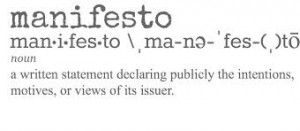Methods Exercise 6
Methodology Manifesto
While the different methodologies used in Africana Studies research are evolving more and more every day, some are clearly more favored than others. Ethnography and oral history are certainly the most straightforward and established methods in Africana research, so perhaps this is the reason there seems to be such a preference towards them. Indeed, these methods are essential to the discipline, particularly because they both involve intimate interaction and usually in-person verbal communication between the researcher and a community. The words, experiences, and opinions of these communities often open up new perspectives that contribute to larger discourses in ways that have either been silenced or ignored in the past. Furthermore, for some projects, oral history and ethnography simply make the most sense and could potentially offer the best information.
However, I do believe that shying away from digital media and performance research keeps entire segments of the black experience hidden from researchers, and subsequently, from academia the general public. The way that young black people today are interacting with the world and with each other is irrevocably tied to technology, social media and the emergence of the digital age. The blogs, videos, pages and even the posts and comments that scatter the internet can greatly inform one’s understanding of what it means to be black in this day and age. Digital research in the past has largely consisted of other methodologies (like ethnography and oral history) being transferred online by way of online surveys and interviews. But the Internet is almost a completely different world, with its own rules of interaction and social norms. I think it warrants its own methodologies.
There is just as much work to be done with performance research, which also holds amazing potential as a research tool. Unlike, Digital Media, performative research should be anything but new. Peoples of African descent have always expressed themselves through performance, whether it is through song, dance, storytelling, or art. There is an irrefutable link to the past when black people perform their culture today and what constitutes a performance is open to the researcher’s interpretation. Thus, just as a dance performance can be analyzed, so can an online persona.
In fact, one particular way researchers can utilize digital media more is by combining it with performance research. Not only can the analysis of past online performance (by way of archived digital media databases like YouTube) be beneficial to Africana research in the same way that Oral History can, but the analysis of current or ongoing forms of online performance (blogs, pages, Facebook, Twitter) can put existing issues into conversation with each other in the same way that ethnography can. Researchers might record a performance themselves, for example, and with or without commentary, analyze the way people respond to it on social media. Or they might analyze a video of a performance already present and pose a question as a comment and analyze those responses. In my own research I plan to use these two methods hand in hand, perhaps in the very ways I’ve just mentioned. It is not only because I believe they are the best ways of exploring my question, but also precisely because I believe that they have the untapped potential within the discipline.
Word Count: 542


Some players enjoy the flexibility and the challenge of randomized words, which makes it a great game for quick mental breaks.
I think its great papers, please method
I appreciate the balance you struck between depth and accessibility.
Fantastic blog. I enjoyed reading your writings. This was a novel that I truly enjoyed. I’ve bookmarked it and am excited to read more from it. Continue your fantastic efforts! five nights at freddy’s
The Papa’s games are a popular series of restaurant and food service management simulation games.
This is indeed a study worth recognizing.
In certain cases, ethnography and oral history are the most sensible choices and may provide the best data.
Oral history and ethnography are just the most practical and may provide the best data for certain projects.
I will learn according to the methods you give, you too.
I am grateful for this website since it inspires me to improve myself.
Face-to-face research with society has always been successful, the details of African life have always been researched.
Face-to-face research with society has always been successful, the details of African life have always been researched.
Face-to-face research with society has always been successful, the details of African life have always been researched.
Additionally, performance research has tremendous untapped potential as a field of study, but there is still a lot of ground to cover.
Methods Exercise 6 | When We Praise: Performing Gospel at Williams